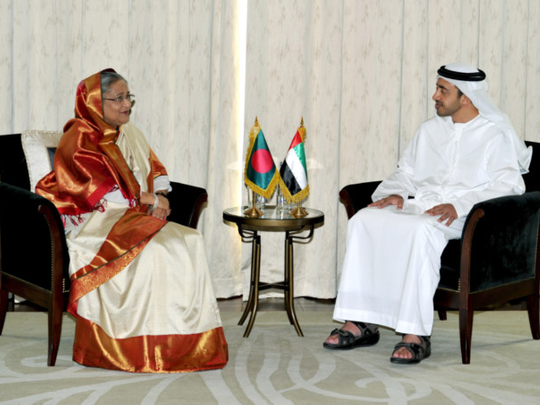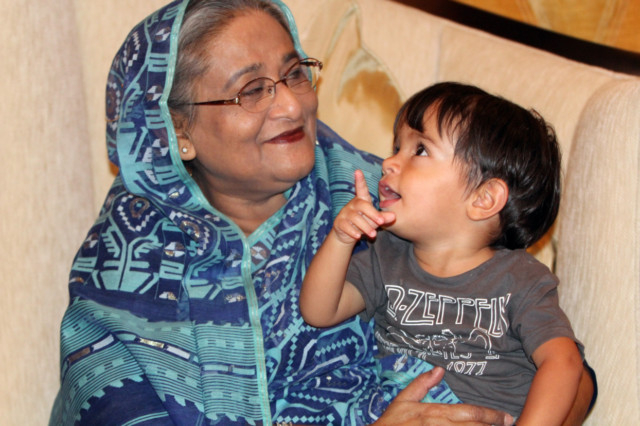
Abu Dhabi: Although a European Union like system may not be possible for South Asia, the current political situation in the region offers better prospects for cooperation, connectivity and trade, Sheikh Hasina, Prime Minister of Bangladesh, told Gulf News on Saturday evening in the capital.
“If leaders of South Asian countries remain united in their core objectives — eradicating poverty, providing food, shelter, health care, sanitation, education, employment and empowerment of the people — no internal and external forces can harm us,” she said. “I want peace not only in Bangladesh, but also neighbouring countries, which is essential for progress. That’s why we will not allow our soil to be used for any destructive activities against anybody.”
Religious harmony is very important in this regard. People of all religious faith should have the right to practice their religion. That is Islam’s teaching. It is religion of peace and harmony.
In Bangladesh Muslims and Hindus celebrated Eid and Durga Puja [a Hindu festival] together. Buddhists celebrate Buddha Poornima [a religious occasion]. All of them perform these festivals peacefully and we will maintain this peaceful coexistence, without which any country or region cannot progress.
Economic cooperation and connectivity are the most important things for South Asia, she said. “[I found the same feeling] when I visited India, Myanmar and China too. China and Afghanistan being the observers in SARC [South Asian Association for Regional Cooperation] is a good development.”
She said now they can take political decisions quickly as major SARC nations have democratically elected governments. There is a proposal for Bangladesh, India, Nepal and Bhutan to produce and share electricity and improve connectivity by road and rail. India has almost agreed to this proposal [which is crucial].
EXCERPTS FROM THE INTERVIEW:-
Gulf News: In South Asia, the relationship with India is very important for Bangladesh. How are your relations with India, especially after the new government in New Delhi?
Sheikh Hasina: We always have wonderful relations with India irrespective of the ruling party in New Delhi.
It is natural to have some problems between neighbours. But my policy has been to have bilateral talks without any mediator, which has solved many problems including disputes on Ganges water sharing and border demarcation. I had a cordial meeting with India’s Prime Minister Narendra Modi in New York recently and relations are excellent.
We have opened ‘border huts’ — local markets in border areas- for people [from both countries] living in those areas. The joint commission for water is discussing water sharing of 54 rivers flowing from India and we are confident of signing Teesta water accord with them.
Are you confident about signing the Teesta accord despite opposition from West Bengal chief minister Mamata Banerjee?
I don’t know (Laughing). I don’t want to make any comment. We know what she did. Indian central government is very cooperative and so also other politicians. She did not cooperate. But I am sure she will realise and cooperate one day.
During your recent China visit the idea of an India-Bangladesh, China, Myanmar-economic corridor was mooted. Will this materialise in the near future?
Yes. I had fruitful discussions with Chinese leaders on the issue. The strategic location of Bangladesh between the ASEAN [Association for South East Asian Nations] and SAARC holds huge potential for itself and for the two economic blocs. So, we are taking steps to increase connectivity through rail, road and air. We are implementing rail and road linking projects to connect with Myanmar.
What are your expectations from your visit to the UAE?
The UAE is not only a good host for nearly a million non-resident Bangladeshis (NRBs); it is also our second biggest source country for remittance.
Although bilateral trade between the two countries has been growing, it is not up to the mark and we feel this has a lot more potential. We want the relationship to be more strategic and inclusive. Both the countries could forge a strategic partnership where the UAE could participate in our development activities and benefit from the high return on investment. We would welcome the UAE to invest in our infrastructure — such as ports, highways, bridges, power and energy sectors as well as tourism.
Since a huge chunk of NRBs live in the Gulf, what is your strategy to maintain relations with Gulf states?
Conservative estimate of NRBs in the Gulf ranges around 4.5 million, which is about half of the 9 million NRBs spread across the world, out of a total population of roughly 160 million Bangladeshis.
We want to expand the relationship with the Gulf in trade, tourism, investment and strategic partnership for economic development.
What about your plan to establish a Bangla cultural centre in Dubai?
Yes, we want to do that. However, we are waiting for a suitable piece of land to develop the project. It would be a great venture to establish a Bangla cultural centre in Dubai.
Do you plan to allow NRBs to vote in Bangladesh elections?
Voting by expatriate Bangladeshis in the country’s elections is a complex issue. However, the Election Commission of Bangladesh is working on it so that NRBs can cast their votes. We want to do that. However, we first need to create the voting infrastructure on a priority basis.
What is the government doing to improve working conditions for around 4 million workers in textile industry and address the issue of child labour across the country?
So far, the government inspected 2,061 out of 3,500 export oriented factories and only 29 (1.45 per cent) factories were shut down for failing to comply with regulations.
The government has been actively engaging with International Labour Organisation, development partners, exporters, buyers and workers associations in taking all possible measures.
The actions include legal and institutional reforms, administrative actions, launching specific programmes, assessment of fire electrical and building safety, follow-up and monitoring. This has improved occupational safety and workers’ rights situation.
The government has created 993 posts of factory inspectors and already appointed 200 inspectors. Besides, Minimum wage of the garments workers has been raised by 77 per cent to BDT 5,300 (Dh251.66) from BDT3,100. The export-oriented garments factories have been made free from child labour long before.
As the opposition parties boycotted the last elections, the Bangladeshi democratic system is being questioned because of the absence of participation of the opposition. How do you respond to the criticism that your decision to abolish the system of caretaker government during elections was the root cause behind the rift between ruling party and opposition?
I would like to say the system of caretaker government has been declared unconstitutional by the highest court of the country. Interestingly, the system was challenged in the highest court by a citizen during the Bangladesh Nationalist Party regime.
Everybody would have to abide by the order of the highest court.
Boycott of some parties did not affect the last elections. Many feared that the chaotic situation created by some opposition parties before the election would continue afterwards. But that did not happen as people do not like recurrence of such violence and anarchy. Now a peaceful situation is prevailing in the country. And after the elections the world leaders extended support to my government. Recently, our speaker has been elected executive chairperson of the prestigious Commonwealth Parliamentary Association (CPA) and one of our parliament members was elected as President of Inter-parliamentary Union (IPU). This is the testimony of world support and confidence for our government and parliament.













